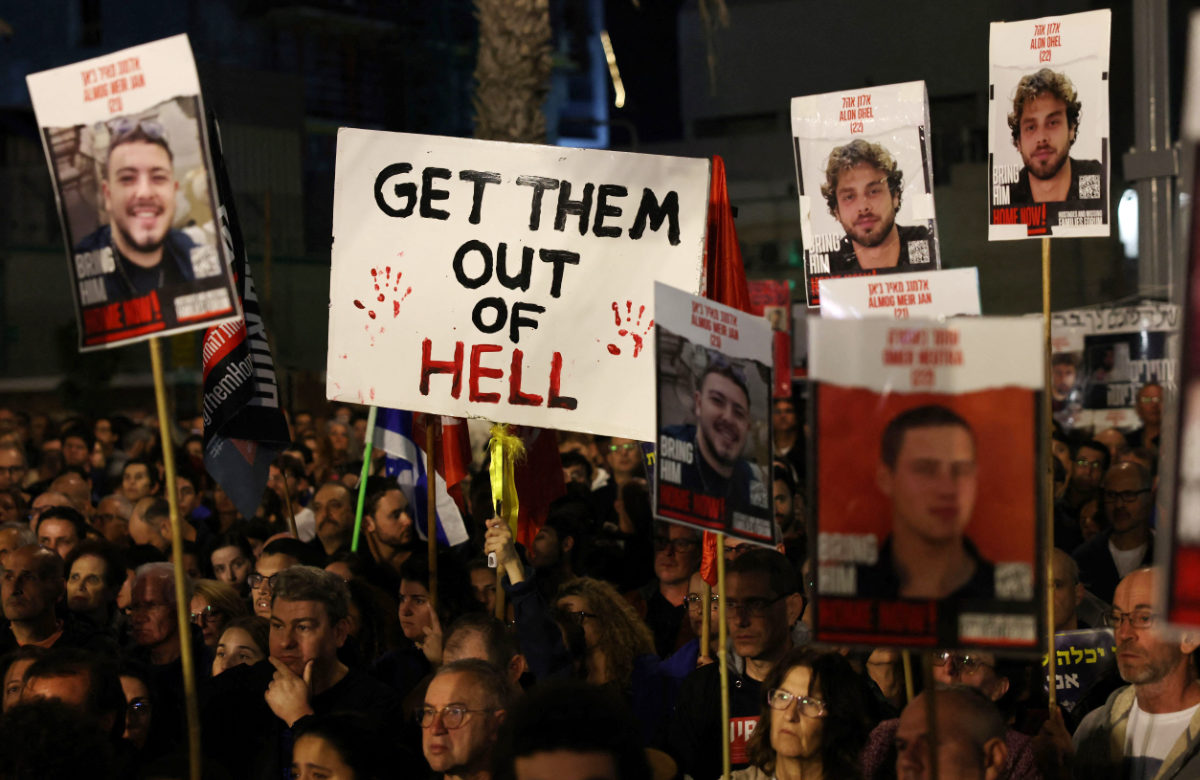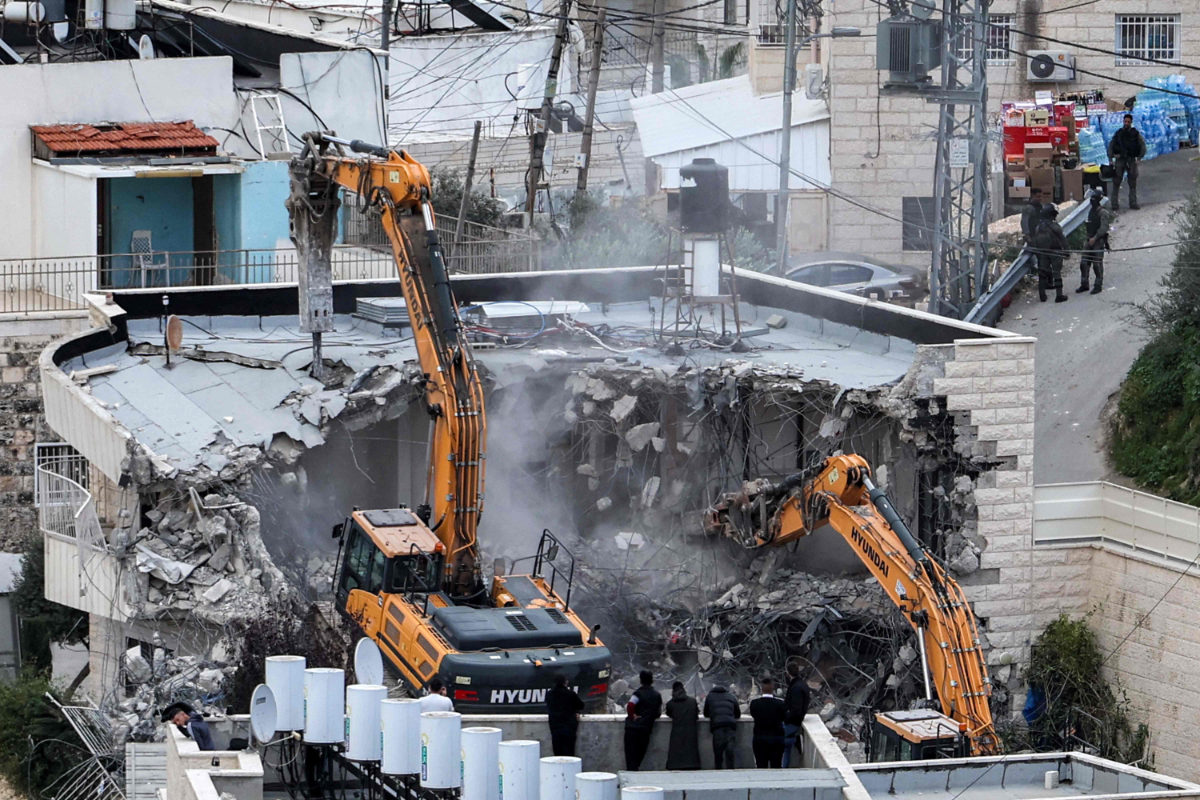GAZA STRIP, Palestinian Territories: Israel kept up its bombing of Gaza on Saturday as its war on Hamas approached its fourth month, with Prime Minister Benjamin Netanyahu vowing to achieve “complete victory” over the Palestinian militants.
AFP correspondents reported Israeli strikes on the southern city of Rafah, where hundreds of thousands of people have sought shelter from the fighting.
Victims of the bombardment were brought to the European Hospital in Khan Yunis, where relatives and mourners gathered.
One of them, Mohamed Awad, wept over the body of a 12-year-old boy and counted the deaths in his family.

Relatives and supporters hold placards bearing portraits of Israeli hostages held in Gaza since the October 7 attacks by Hamas in southern Israel, during a rally calling for their release, in Tel Aviv on December 30, 2023. (AFP)
“My brother, his wife, his children, his relatives and the brothers of his wife — there are more than 20 martyrs,” Awad, a journalist, told AFP.
A defiant Netanyahu vowed that Israel would continue its campaign to “eliminate Hamas, return our hostages and ensure that Gaza will no longer be a threat to Israel.”
“We have to put everything aside... until the complete victory is achieved,” Netanyahu said in a statement released by his office.
Army spokesman Daniel Hagari said Israel had “completed the dismantling of the Hamas military framework in the northern Gaza Strip” and would now focus on the center and the south.
The war was triggered by an unprecedented attack on Israel launched by Hamas on October 7, which resulted in the deaths of around 1,140 people, most of them civilians, according to an AFP tally based on official Israeli figures.

Israeli military excavators demolish the house of the Palestinian Shuqairat family, which was reportedly built without a construction permit, in the Jabal Mukaber neighbourhood of Israeli-annexed east Jerusalem on January 3, 2024. (AFP)
The militants also took around 250 hostages, 132 of whom remain in captivity, according to Israel, including at least 24 believed to have been killed.
In response, Israel is carrying out a relentless bombardment and ground invasion that have killed at least 22,722 people, most of them women and children, according to the Gaza health ministry.
In a statement on Saturday, the ministry said it had recorded more than 120 deaths over the past 24 hours.
Defense Minister Yoav Gallant presented Israel’s first plan for the “day after” on Thursday, though it has not yet been adopted by Israel’s war cabinet.
However, a senior Palestine Liberation Organization official said on Saturday that Gaza’s future “is determined by the Palestinian people, not Israel.”
“All scenarios proposed by the occupation politicians and leaders are doomed to fail,” said Hussein Al-Sheikh, secretary general of the PLO executive committee.
Top Western diplomats were in the region on Saturday as part of a fresh push to boost the flow of aid into Gaza and address mounting fears of a wider conflict.
In Beirut, European Union foreign policy chief Josep Borrell met a senior figure in the political wing of Iran-backed militant group Hezbollah as part of efforts to Lebanon being drawn into the war, an EU source confirmed.
Borrell held talks with the head of Hezbollah’s parliamentary bloc, Mohammad Raad, Lebanese media reported.
The EU is “engaging in diplomatic dialogue with all relevant political representatives who have influence on the situation on the ground or have a stake in it,” the EU source said.
The Hamas-allied Hezbollah movement has been trading near-daily fire with Israeli forces since early October and earlier fired a barrage of dozens of rockets at an Israeli military base in response to the killing of a senior Hamas figure in a suspected Israeli strike in Beirut on Tuesday.
Before heading to Saudi Arabia, Borrell called for a redoubling of peace efforts.
“Israel has declared a goal to eradicate Hamas. There must be another way to eradicate Hamas that doesn’t... create so many people getting killed,” he said.
Meanwhile, US Secretary of State Antony Blinken was in Greece as part of a tour that will take him to several Arab states ahead of talks in Israel and the occupied West Bank next week.
Blinken said he wants to make sure the conflict in the Middle East “doesn’t spread.”
“One of the real concerns is the border between Israel and Lebanon, and we want to do everything possible to make sure we see no escalation,” he added.
Hezbollah said it had targeted the Israeli military’s Meron air control base with 62 missiles in its “initial response” to the killing of Saleh Al-Aruri, Hamas’s deputy leader, in Beirut.
The Israeli army reported “approximately 40 launches from Lebanon” and said it struck Hezbollah “military sites” in response.
By the afternoon, warning sirens had sounded seven times in northern Israel, the military said.
Contacted by AFP, a military spokesperson confirmed the mountaintop base had been targeted but did not say whether it was damaged. There were no immediate reports of any casualties.
Civilians in the Hamas-ruled Gaza Strip have borne the brunt of the conflict as the scale of the destruction has triggered mass displacement and a deepening humanitarian crisis.
With swathes of the territory reduced to rubble, UN humanitarian chief Martin Griffiths on Friday said “Gaza has simply become uninhabitable.”
The World Health Organization says the majority of Gaza’s 36 hospitals have been put out of action by the fighting, while remaining medical facilities face dire shortages.
In the central Gaza town of Deir Al-Balah, men clambered carefully around the concrete ruins and twisted rebar where Mohammad Al-Attar’s house stood before rockets that he blamed on Israel destroyed it.
“There was no prior warning or anything,” Attar said, his hands stained grey from the debris. “There’s still the corpse of a little girl” underneath.
Akram El-Shafei, a journalist, died at the European Hospital in Khan Yunis from wounds sustained in Gaza City in November.
Shafei’s condition had initially improved, said relative Magda El-Shafei, but he “needed treatment” and there was “nothing” available.
“He’s gone,” she told AFP.
The World Health Organization says the majority of Gaza’s 36 hospitals have been put out of action by the fighting, while remaining medical facilities face dire shortages.


























